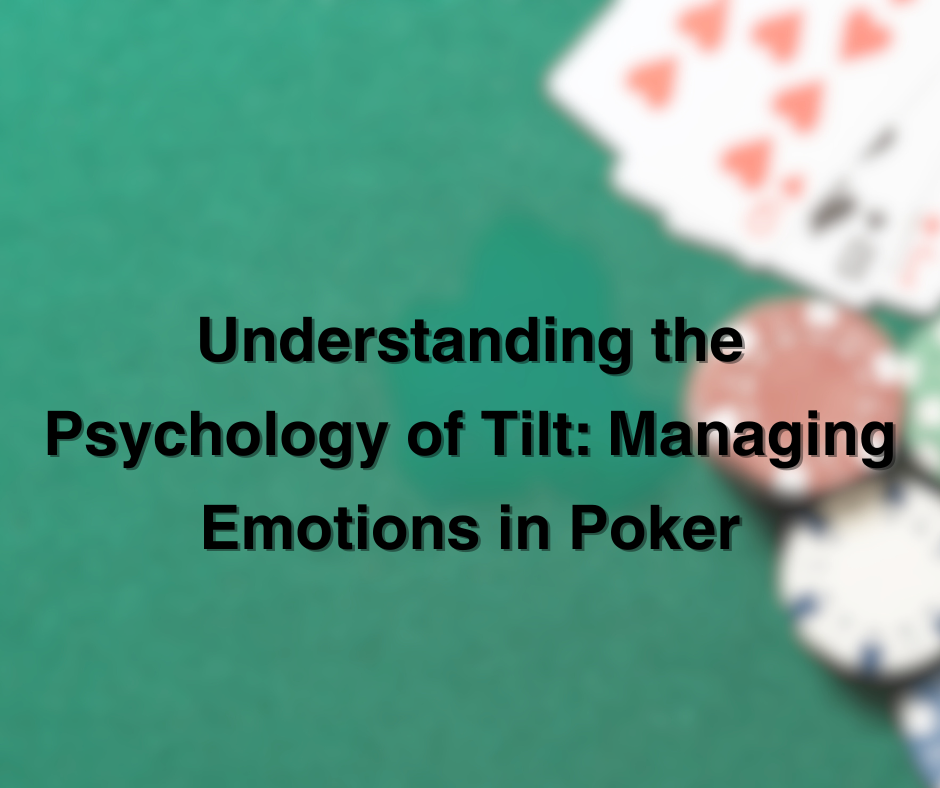
विषय-सूची
टॉगलपोकर में झुकाव क्या है?
In poker, tilt refers to a state of emotional or mental frustration that causes a player to play suboptimally. It often occurs after a significant loss or a series of bad beats, leading to irrational decision-making and increased aggression.
झुकाव पोकर खिलाड़ियों को कैसे प्रभावित करता है?
Tilt can have a profound impact on poker players, both psychologically and financially. It impairs judgment, leads to impulsive decisions, and causes unnecessary risks. This emotional state often creates a vicious cycle—losses lead to tilt, which leads to more poor decisions and further losses. Whether you’re just starting to play poker online or are a seasoned pro, recognizing and overcoming tilt is key to long-term success.
झुकाव के सामान्य ट्रिगर क्या हैं?
Several factors can trigger tilt in poker players. Losing a significant hand, experiencing a series of bad beats, or encountering an obnoxious opponent can all contribute to tilt. Additionally, external
factors such as fatigue, stress, or distractions can exacerbate tilt and make it harder to control.
If you’re struggling with repeated losses, our guide on how to handle losing streaks without going on tilt offers practical tips to stay composed.
खिलाड़ी झुकाव को कैसे पहचान सकते हैं?
पोकर खिलाड़ियों के लिए इसके प्रभावों को कम करने के लिए झुकाव को पहचानना महत्वपूर्ण है। झुकाव के संकेतों में हृदय गति में वृद्धि, पसीना, उथली श्वास और बढ़ी हुई भावनात्मक प्रतिक्रियाएं शामिल हो सकती हैं। खिलाड़ियों को अपनी निर्णय लेने की प्रक्रिया में बदलाव के प्रति भी सचेत रहना चाहिए, जैसे कि आवेगी सट्टेबाजी या रणनीतिक गेम प्लान से विचलन।
झुकाव के प्रबंधन के लिए रणनीतियाँ
Managing tilt requires a combination of self-awareness and discipline. One strategy is to take a break from the game to regain composure and refocus. Deep breathing exercises or meditation can help calm the mind and reduce stress. Setting limits on the amount of money or time spent playing can also prevent tilt from escalating.
If you’re playing with new poker rules in 2025, understanding rule changes can reduce the stress and surprises that trigger emotional reactions.
भावनात्मक लचीलापन विकसित करना
Building emotional resilience is essential for poker players to cope with the ups and downs of the game. This involves accepting that variance is inherent in poker and focusing on long-term results rather than short-term outcomes. Seeking support from peers or a mentor can provide valuable perspective and encouragement during challenging times.
or beginners and pros alike, coping with swings in the game is crucial. Our article on losing streaks and tilt dives deeper into this mindset.
पोकर में मानसिकता की भूमिका
Mindset plays a significant role in how players approach tilt. Adopting a growth mindset, which
emphasizes learning and improvement, can help players bounce back from setbacks and maintain a positive attitude. Avoiding negative self-talk and reframing losses as opportunities for growth can also bolster mental resilience.
Players who start playing poker online with a focus on mindset tend to grow faster and tilt less often.
मेज पर सचेतनता की खेती
पेशेवर मदद लेना
कुछ खिलाड़ियों के लिए, झुकाव को प्रबंधित करने के लिए पेशेवर सहायता की आवश्यकता हो सकती है। संज्ञानात्मक-व्यवहार थेरेपी (सीबीटी) में प्रशिक्षित चिकित्सक या परामर्शदाता व्यक्तियों को झुकाव में योगदान देने वाले अंतर्निहित मनोवैज्ञानिक मुद्दों की पहचान करने और उनका समाधान करने में मदद कर सकते हैं। वे मुकाबला करने की रणनीति भी सिखा सकते हैं और खिलाड़ियों को अपनी भावनाओं को अधिक प्रभावी ढंग से प्रबंधित करने में मदद करने के लिए निरंतर सहायता प्रदान कर सकते हैं।
एक सहायक पोकर समुदाय का निर्माण
पोकर में झुकाव पर काबू पाने की रणनीतियाँ: एक व्यापक मार्गदर्शिका
झुकाव के ट्रिगर्स की पहचान करना
Bad Beats: Experiencing a string of unlucky hands or losing a significant pot can trigger feelings of frustration and anger.
Obnoxious Opponents: Dealing with rude or disrespectful opponents can disrupt focus and exacerbate tilt.
Fatigue and Stress: Physical and mental exhaustion can impair judgment and make it harder to control emotions.
Distractions: External distractions, such as noise or interruptions, can disrupt concentration and increase susceptibility to tilt.
भावनात्मक लचीलापन विकसित करना
भावनात्मक विनियमन ध्वनि पोकर निर्णय लेने का आधार है। जब क्रोध, भय या हताशा अंदर आती है, तो वे निर्णय को बादल देते हैं और जोखिम मूल्यांकन को विकृत करते हैं। अनुसंधान से पता चलता है कि नैतिक क्रोध जैसी नकारात्मक भावनाएं पोकर निर्णयों में गणितीय सटीकता को काफी कम कर देती हैं, खासकर जब खिलाड़ी सामाजिक रूप से देखे जाते हैं।
Maintaining a calm, analytical mindset—even after bad beats—preserves your ability to evaluate pot odds and ranges objectively.
मेज पर दिमागीपन की खेती करना
Practicing mindfulness can help poker players stay grounded and focused during gameplay. Techniques such as:
Visualization: Visualizing successful outcomes and staying focused on the present moment can enhance concentration and prevent tilt.
Body Scanning: Paying attention to bodily sensations can help players stay attuned to their emotions and reactions, enabling them to make more rational decisions.
Sensory Awareness: Staying mindful of sensory experiences, such as the feel of the cards or the sounds of the chips, can enhance presence and prevent distractions.
स्व-विनियमन रणनीतियों को लागू करना
झुकाव के प्रबंधन और मेज पर संयम बनाए रखने के लिए स्व-नियमन महत्वपूर्ण है। प्रमुख स्व-नियमन रणनीतियों में शामिल हैं:
Taking Breaks: Stepping away from the game when emotions run high can provide valuable time to regroup and refocus.
Deep Breathing: Engaging in deep breathing exercises can help calm the nervous system and reduce stress levels.
Setting Limits: Setting limits on the amount of time or money spent playing can prevent tilt from escalating and protect bankroll management.
अंतिम विचार: झांसा देने वाले बंदरों का झुकाव
Tilt in poker isn’t just about losing—it’s about how you respond to loss. From identifying triggers to managing emotions and seeking support, tilt is a challenge that every player must face.
At Bluffing Monkeys, we’re here to help you sharpen your game, stay composed under pressure, and make smarter plays with every hand.
